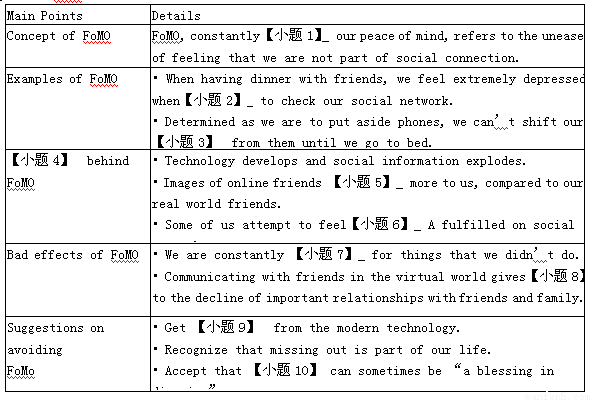题目内容
Escape from FoMO
Here’s a test you might enjoy: rate these situations on a number scale, ranging from 1 for mild discomfort to 7 for unbearable distress.
Situation 1: you’re visiting New York City and realize there’s no way you’ll be able to get to all the exhibits, see all the recommended plays or take in even part of the“musts”. How do you feel now? Something like 5?
Situation 2: you’re at dinner with friends, and you’ve all agreed to make it a strictly phone-free evening. But your smart phone won’t stop beeping Twitter and text alerts. Something is obviously up in your social network, but you can’t check. Even 7 wouldn’t match the stress you’re feeling now.
Welcome to FoMO (Fear of Missing Out), the latest mental disorder caused by social media connections sharing updates that leaves individuals feeling that they are missing out on something more exciting, important, or interesting going on somewhere else. It is an outcome of technological advancement and booming social information. According to a recent study, 56 percent of those who use social networks suffer this.
It is not uncommon that at night when you’ve sworn again to put the phone aside or turn off the computer, you cast one last glance at the screen on your way to bed in case you miss some titbit (趣闻)supplied by mere acquaintances or even strangers’ requesting your “friendship”.
We all know the studies showing that end-of-life regrets centre on what we didn’t do, rather than on what we did. If so, constantly watching others doing things that we are not is rich ground for a future of looking back in sorrow. Attractive online images—so charming from afar—make FoMO more destructive. Technology has become the major construct through which we define intimacy (亲密).You may look on in wonder as someone taps out an endless text message instead of actually talking to the person they’re with. Being connected to everyone, all the time, is a new human experience; we’re just not equipped to cope with it yet.
Researchers say our dependence on technology can be reduced if we manage to separate ourselves, even for short periods of time, from our gadgets. However, the problem can only be settled when we grasp that our brains and our humanity—not our technologies—enable this addiction. We cannot seek solutions without honestly asking ourselves why we are so afraid of missing out. Researchers find FoMO occurs mostly in people with unfulfilled psychological needs in fields such as love, respect and security. FoMO levels are highest in young people, in particular young men.
What, then, can we do about something so damaging to our quality of life? The best way to cope with FoMO is to recognize that, at our fast-paced life, we are sometimes bound to miss out. Instead of trying to maximize our benefits, we seek a merely “good enough” result. If you still doubt that“good enough” is the best cure for FoMO, the words of the American essayist and poet Ralph Waldo Emerson might strike the right chord,“For everything you have missed, you have gained something else, and for everything you gain, you lose something else.”
Escape from FoMO


